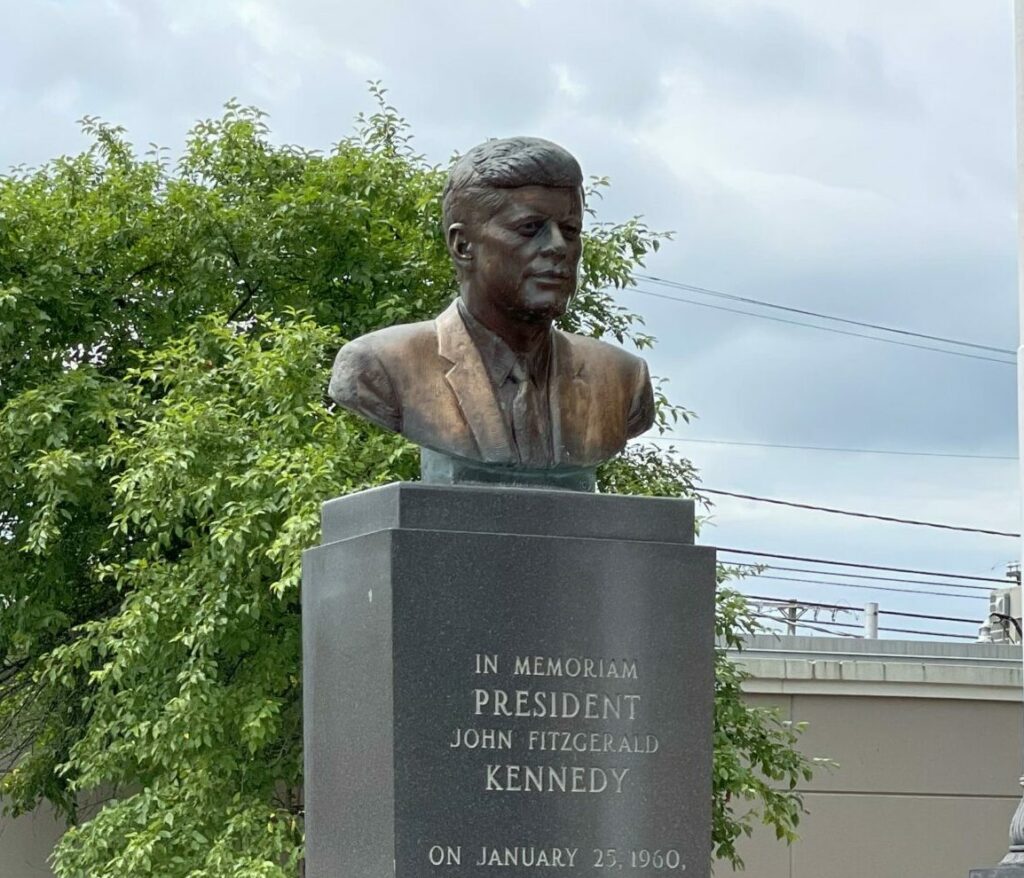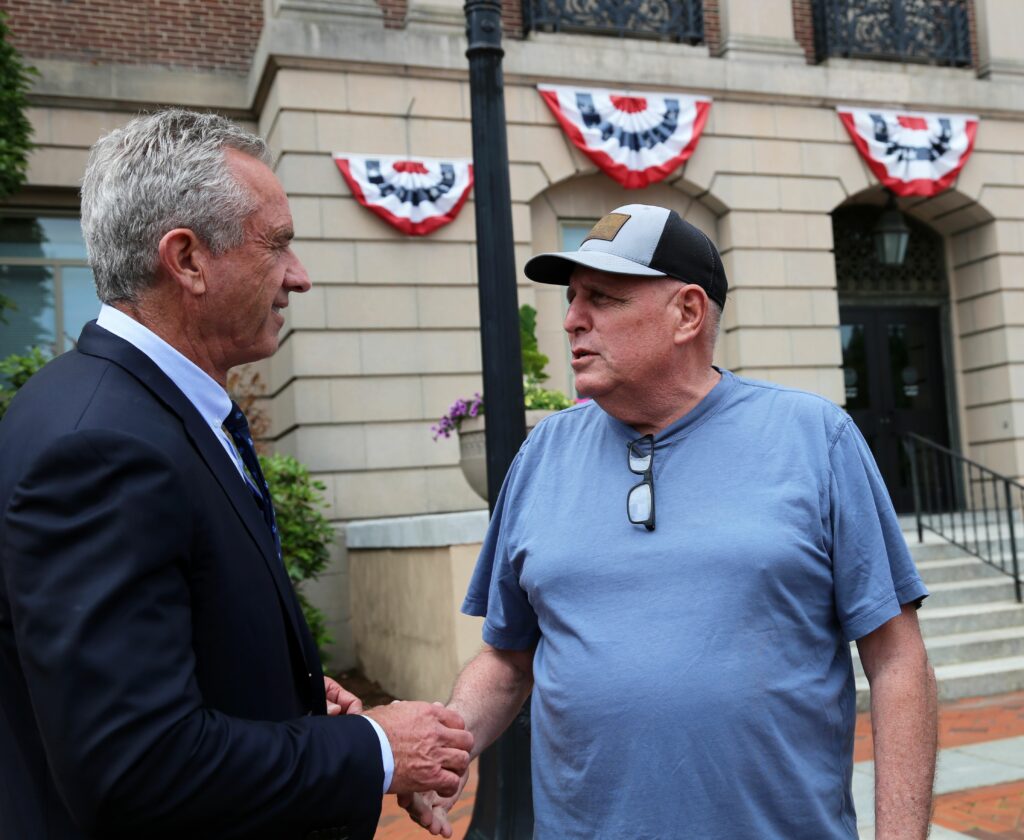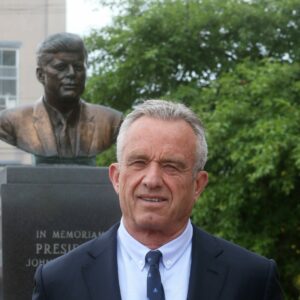Just hours before delivering a speech on foreign policy that he says he was inspired by the words of his famous uncle, Robert F. Kennedy Jr. made his first-ever visit to the statue of JFK at Nashua City Hall on Tuesday.
The bust of President John F. Kennedy marks the spot where, on January 25, 1960, he made the first stop of his successful presidential campaign. Kennedy carried New Hampshire with 85 percent of the primary vote later that year.
RFK Jr. hopes some of that success will come his way as he challenges incumbent President Joe Biden.
“I was at the convention in 1960 in Los Angeles,” Kennedy told NHJournal during his visit to city hall. “It was the first time that I had stayed up all night, and then I flew back with him the following day. I sat next to him on the airplane the whole way.
He also recounted how he and the other nieces and nephews of the then-Massachusetts senator hit the campaign trail.

(CREDIT: Allegra Boverman for NHJournal)
“We were handing out buttons, knocking on doors, and shaking hands with people,” Kennedy said. “We were young, but we knew he was in a real contest.”
JFK would go on to defeat Vice President Richard Nixon in the closest election since 1884 when Democrat Grover Cleveland beat Republican James G. Blaine by about 24,000 votes.
But for a young RFK Jr. — he was nearly seven on Election Day 1960 — JFK “was just our uncle. He was the center of gravity in our family, but he was also the uncle who took us sailing and played with us.”
Kennedy was clearly moved by the sight of the bust, erected by the city in 1965. And he noted many hands had clearly touched the statue, a sign of the lingering affection for President Kennedy.
Kennedy’s visit had a major impact on the people of Nashua at the time, according to press reports.
“I do not know any time in the life of this country when a comparable responsibility has been placed upon the people of the United States,” Kennedy said in his remarks. “And therefore, what we start here in New Hampshire today, I believe, must succeed next summer and next November.”
The candidate then made his way through the cold and snow to campaign in the city clerk’s office.
“We knew he was coming. But we didn’t know that John F. Kennedy would come right to our desk and shake hands with all of us,” Dolly Bellavance, who worked in the clerk’s office, recalled years later.
“We didn’t wash our right hand for at least a week.”
Kennedy’s memory is still powerful among Granite State Democrats. And what would his uncle think of RFK Jr.’s unorthodox, outsider campaign more than 60 years later?
“I think that he probably be doing the same thing that I’m doing now. If I didn’t believe that, I probably wouldn’t be running. I think my uncle had very good judgment, and I think the values I’m trying to represent during this campaign are his values.”
One area of overlap Kennedy highlighted is in foreign policy, previewing his speech at St. Anselm College later that night.
“My speech tonight is largely derivative of my uncle’s speech at American University in 1963, now known as the ‘Peace Speech.’ To me, it was one of the most extraordinary speeches in American history and his best speech ever.”

Robert F. Kennedy, Jr. chats with Jim Maglio, a Massachusetts retiree who recently moved to Nashua, near the JFK statue outside City Hall.
That was because “it had a tremendous impact” on the Soviet Union, RFK Jr. said — a claim bolstered by the fact Soviet leader Nikita Khrushchev reportedly called it “the greatest speech by any American president since Roosevelt.”
It helped lead to the United States, the Soviet Union, and the United Kingdom signing the Limited Nuclear Test Ban Treaty — forbidding nuclear testing in the atmosphere, underwater, or in outer space — in Moscow two months later.
“In that speech, my uncle did something extraordinary. He asked Americans to put themselves into the shoes of the Russians,” RFK Jr. said.
Today, it could be argued that China has put itself into Russia’s shoes and is walking a path toward a new Cold War. The Wall Street Journal’s report Tuesday that China and Cuba are negotiating a joint military training facility on the island nation evoked memories of the Cuban Missile Crisis of the JFK presidency.
How would a President RFK Jr. respond?
“I agree that China wants to dominate the world, but they want to do it economically, not through military confrontation. And I think the U.S. should accept that challenge. The competition would be good for both America and China.”
Asked if it was time for the U.S. to dust off its “quarantine” strategy for Cuba in response to China’s military plans, however, Kenedy said no. He argued U.S. actions abroad likely provoked China into action.
“I don’t think it’s a good idea to have the Chinese military in Cuba, but I also think the U.S. putting military bases in the South China Sea is also a mistake.”
It reflects RFK Jr’s overall foreign policy view that projecting U.S. power abroad is fundamentally a political mistake, a view shared by voters on the Bernie Sanders left and the Donald Trump right.
And, Kennedy said, his uncle would agree with him, particularly on Ukraine.
“I think my position on Ukraine is consistent with everything he believed. He believed the function of the intelligence community was to provide the military/industrial complex with a steady pipeline of new wars. And in [JFK’s] era, at least the intelligence agencies were legally prohibited from propagandizing the American people, but now they aren’t.
“And so we’re treated with this constant barrage of simplistic, comic-book propaganda about ‘good vs. evil’ that I think has been very damaging to American foreign policy,” Kennedy said.
Being from America’s most famous political family — and having his own struggles with substance abuse in the past — NHJournal asked if Kennedy had any thoughts on the news President Joe Biden’s son Hunter was pleading guilty to misdemeanor gun and tax charges.
“I wish I had a better answer for you, but to be honest, I just haven’t been following that story very closely,” Kennedy said. “When the news is about possible implications for the president, then I follow it more.”
Many of Kennedy’s family members have spoken out against his decision to seek the presidency and condemned his views on issues ranging from vaccines to foreign policy. At the same time, the Kennedy legacy plays a key role in RFK Jr.’s candidacy. How does he resolve the two?
“At this point, it’s hard for me to separate myself from, you know, my family (and) its legacy because I’ve lived with it my whole life. I see that legacy as a package of values that all of us in the family have an obligation to nurture and to try to integrate into our lives and our politics.”
Ask what one question he would have for President John F. Kennedy if he could speak to him today, RFK Jr. paused.
“It would be a never-ending conversation.”





